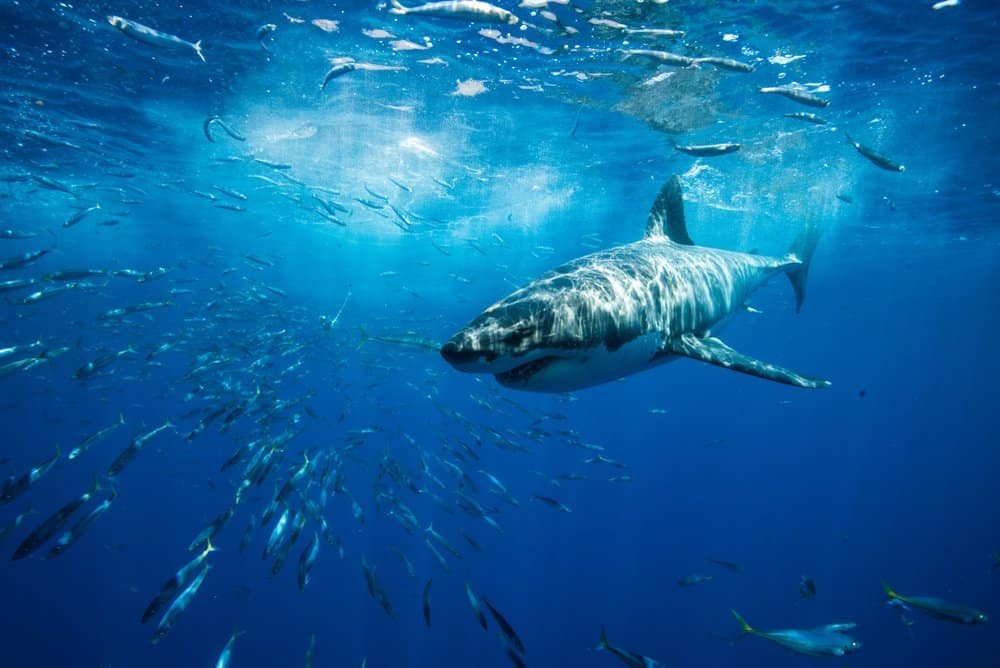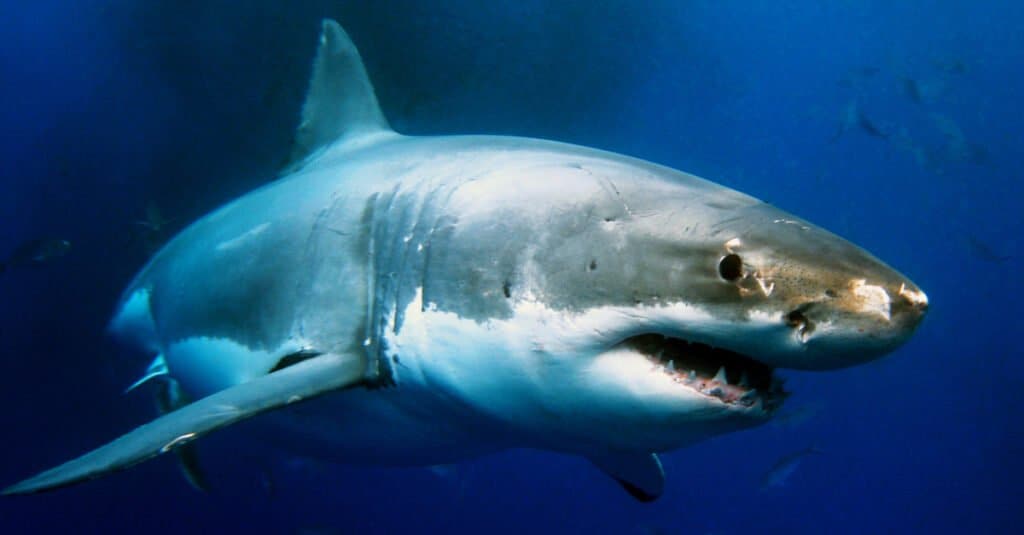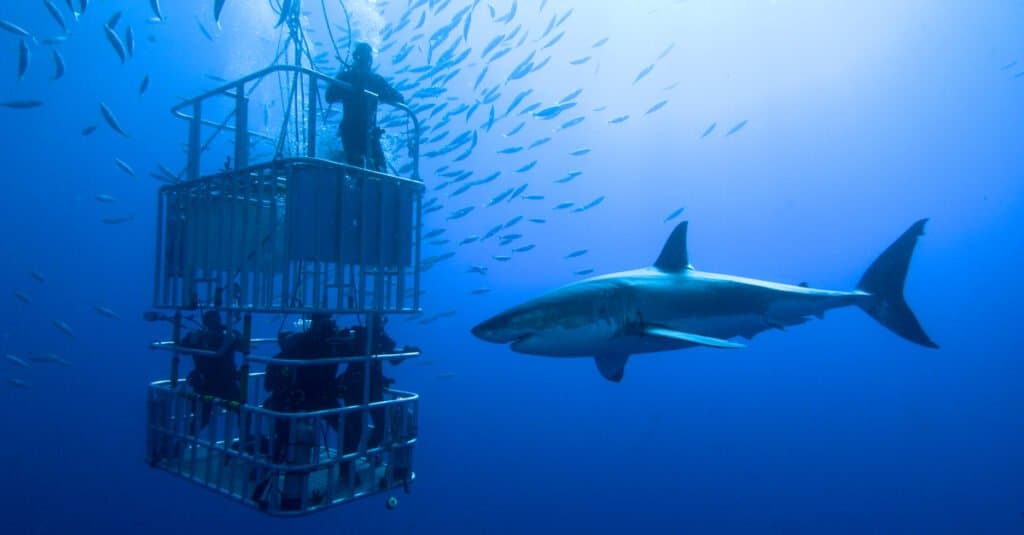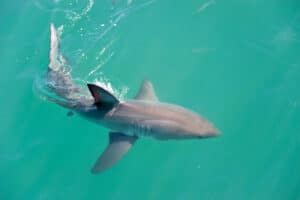Great whites are the largest predatory fish in our seas and one of the most feared creatures on our planet. But, is this reputation deserved? Are great white sharks the most aggressive sharks in the world?
Here, we’ll take a journey through the key characteristics of the great white, starting with what makes them so fearsome. We’ll learn about great whites’ favorite foods, hunting methods, and exaggerated aggressiveness. Then, we’ll determine just how dangerous they are and what you can do to minimize your chances of attack. Finally, we’ll discover just what you can do to help conserve these incredible creatures and protect our oceans for generations to come.
Great White Sharks: Apex Predators

Great white sharks are ferocious predators.
©Jennifer Mellon Photos/Shutterstock.com
Great white sharks are apex predators. That means that adults have no natural predators (except for the occasional orca whale). They’re also a keystone species, which means that the entire marine ecological system rests on their scaly shoulders. Great white sharks are critical to the health and longevity of our oceans, but are they the most aggressive sharks in the world?
Let’s learn more to find out!
What Do Great Whites Eat?

Great White Sharks ( Carcharodon carcharias ) will breach to try to catch seals.
©Sergey Uryadnikov/Shutterstock.com
Great whites weigh about 77 pounds at birth and measure around five feet long. They start out eating fish and other smaller sharks. At this size, they’re easy targets for other sharks. Young great whites stick close to the coast, where waters are shallow, safe, and warm. As they grow, they venture farther and farther from shore into deeper, colder waters to hunt. Adult great whites often reach lengths of 15 feet or more, and have a wide variety of prey to choose from. They eat large fish, seals, sea lions, sea turtles, dolphins, small whales, and even dead whales.
How Do Great Whites Hunt?

Adults can swim up to 15 miles per hour and rely on the element of surprise when attacking.
©Alexius Sutandio/Shutterstock.com
Great white sharks are constantly on the move; they spend much of their time searching for food. Like snakes, they swallow their prey whole or, in great mouthfuls. Their teeth are designed to shear flesh, like a series of serrated knives, and their torpedo-shaped bodies are built for speed. So, when they sense prey—great whites have excellent senses of sight and smell—they swim rapidly at it, either from below or from the side.
During the surprise attack, the great white will attempt to bite the prey on impact. Often, this initial bite inflicts massive damage. But, great whites don’t stick around to keep biting. Instead, they move off and wait for their prey to bleed out before returning to feed.
Are Great Whites Aggressive?

Great white sharks attack to feed but attacks on humans are a case of mistaken identity.
©Alessandro De Maddalena/Shutterstock.com
So, are great whites aggressive or just terrifying? The answer is a little of both. Great white sharks are generally solitary hunters who only occasionally come together to socialize. They, of course, attack to feed, but countless hours of scientific research have shown that great white sharks do not attack every human they see. In fact, the more we learn about these incredible creatures, the more our attitudes towards human-shark encounters change. Unfortunately, because of their size, power, and lethal hunting prowess, great white sharks are responsible for more attacks on humans than any other shark species.
Why Do Great Whites Attack Humans?

Great white sharks have been responsible for 354 total recorded attacks on humans, 57 of which were fatal.
©Stefan Pircher/Shutterstock.com
Despite their fame, scientists know very little about the behavior, life cycle, or even lifespan of great white sharks. This scant knowledge makes it difficult, if not impossible, to determine exactly why unprovoked attacks on humans occur. One researcher with the Australian Shark Attack File even compiled the various reasons given for attacks. They include curiosity, mistaken identity (sharks mistaking humans for seals), hunger, confusion, attractants (like splashing, blood, or bright colors), and even territorial self-defense.
However, unprovoked attacks on humans are extremely rare, especially considering how much time humans and great whites spend swimming in the same waters. So, while great whites attack more humans than any other shark, there is no clear link between these attacks and aggressive behavior.
How To Minimize Your Risk Of Being Attacked By A Great White Shark

There are many steps you can take to minimize your chances of being attacked by a great white shark.
©Willyam Bradberry/Shutterstock.com
Shark attacks happen when humans go into the water. Fortunately, they’re extremely rare. There are, however, several things you can do to reduce your risk of having a negative encounter with a shark.
First, avoid wearing jewelry, or anything shiny or reflective, in the water. Also, stay away from bright colors and high-contrast fabrics, as these may catch a shark’s interest. Great whites hunt mainly at dawn and dusk, so stay out of the water at these times. Further, don’t swim in areas where seals congregate or areas frequented by fishermen. Finally, always swim with a buddy, don’t stray too far from shore, and try not to splash in one place for too long.
Great White Shark Conservation: What You Can Do To Help
They might have the dubious distinction of being the most aggressive sharks in the world, but humans are actually a much greater threat to great whites than they are to us. To support great whites and other sharks, consider reducing the amount of plastic, especially single-use plastic, you use. Sharks around the world are at risk of extinction due to overfishing, plastic pollution, and the shark fin soup industry. Educate yourself, speak out against finning (the practice of cutting off a shark’s fins and throwing them back into the water to bleed to death), and appreciate the beauty, and hunting prowess, of these incredible creatures from a safe distance.
The photo featured at the top of this post is © Martin Prochazkacz/Shutterstock.com
Thank you for reading! Have some feedback for us? Contact the AZ Animals editorial team.






